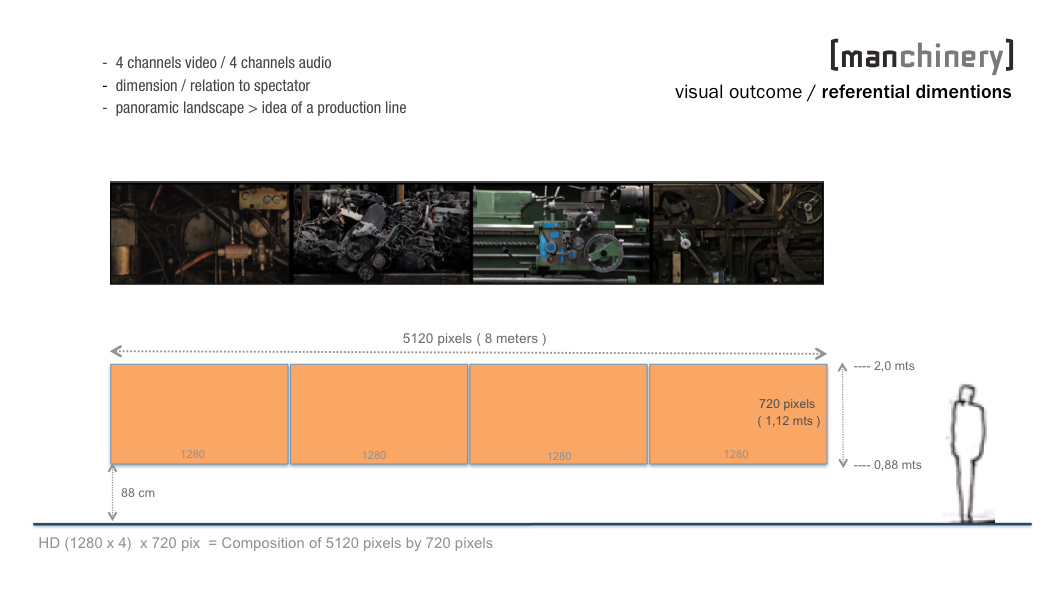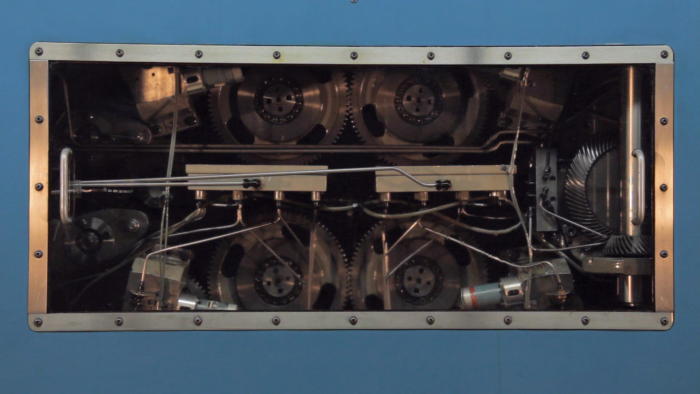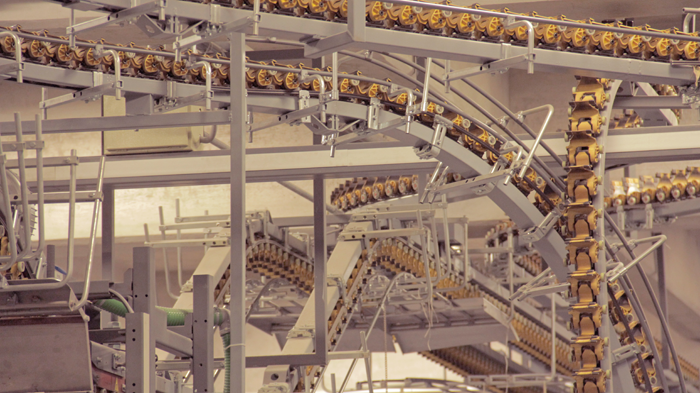User:Luis Soldevilla/Archive: Difference between revisions
(→Photos) |
No edit summary |
||
| (23 intermediate revisions by one other user not shown) | |||
| Line 1: | Line 1: | ||
Luis Soldevilla / Ma(n)chinery - graduation project / 2nd year Lens-Based | Luis Soldevilla / Ma(n)chinery - graduation project / 2nd year Lens-Based | ||
= Ma(n)chinery = | = Ma(n)chinery = | ||
== Description == | == Description == | ||
The Ma[n]chinery installation places the viewer in front of | The ''Ma[n]chinery'' installation places the viewer in front of four projections , a big composition that renders people, machines, gears and devices as different pieces working together for a bigger system or organism. The visual objective is to create a choreograhy of interconneted elements that render the pace of society ( urban life) as a production line. A visual orchestration of diverse elements or situations cross-linked by dynamics of motion and relationships of cause and effect. | ||
The projections become a panoramic window into the insides of this machinery. The | The projections become a panoramic window into the insides of this machinery. The large format ( ideal projection canvas of 8 meters long by 1,12 meters high ), plus the fact that the spectator is smaller than the projection, reinforces the idea that the social machinery is much bigger than the individual. The intention is to invite the viewer to reflect on its role and relevance as part of this machinery. | ||
The narrative is | The narrative, which presented through the edit, is activated by the constant tension between “the machine” which aims to keep producing and accelerating, and the attempts of “the people" to control it. The struggle of these two forces is represented through the alterations in the production chain; interruptions, aceleration, changes of direction. | ||
The piece is composed of | The piece is composed of two parts: The first is more related to the fordist in-line production era, in which the link between elements (screens) is more mechanical; the second part is more related to the era of information technologies, in which the action / reaction is more digitally triggered. These two parts also talk about how people interact with machines (acoordingly to each era respectively), and how this relationship generated differents methods of control and production. | ||
The artistic goal is to visualize these topics through the intricate beauty of an assembly line, a visual orchestration of machines, people and motion. As for the research, the objective is to set a | The artistic goal is to visualize these topics through the intricate beauty of an assembly line, a visual orchestration of machines, people and motion. As for the research, the objective is to set a theoretical background that works as the foundation for use of visual metaphors. The thesis besided this, will also be a detailed documentation of the whole the process. | ||
== Media == | == Media == | ||
| Line 22: | Line 18: | ||
[[File:Ma(n)chinery - reference visual outcome.png]] | [[File:Ma(n)chinery - reference visual outcome.png]] | ||
[[File:Ma(n)chinery - still 01.png]] | |||
[[File:Ma(n)chinery - still | [[File:Ma(n)chinery - still 01 alta test.png|700px|still image 01]] | ||
[[File:Ma(n)chinery - still 02.png|700px|still image 02]] | |||
[[File:Ma(n)chinery - still 03.png|700px|still image 02]] | |||
=== Video === | === Video === | ||
{{#widget:Vimeo|id=25758974|width=640|height=360}} <br/> | |||
To see the images used in the composition go to: | |||
[https://vimeo.com/42053518 | |||
Password : catalogue | |||
== Essay == | == Essay == | ||
*[[Media: ··_Machinery_Graduation_Proj_Proposal_-_final_draft_with_amendments.pdf | Project proposal - 2nd draft]] | *[[Media: ··_Machinery_Graduation_Proj_Proposal_-_final_draft_with_amendments.pdf | Project proposal - 2nd draft]] | ||
*[[Media: -_Luis_-_new_abstract.pdf | Index / thesis structure]] | |||
*[[Media:Luis - thesis - project report.pdf | THESIS / PROJECT REPORT]] | |||
== Additional Information == | == Additional Information == | ||
| Line 73: | Line 53: | ||
[[Category: Graduation Projects]] | [[Category: Graduation Projects]] | ||
[[Category: 2011/2012]] | |||
Latest revision as of 15:30, 24 September 2012
Luis Soldevilla / Ma(n)chinery - graduation project / 2nd year Lens-Based
Ma(n)chinery
Description
The Ma[n]chinery installation places the viewer in front of four projections , a big composition that renders people, machines, gears and devices as different pieces working together for a bigger system or organism. The visual objective is to create a choreograhy of interconneted elements that render the pace of society ( urban life) as a production line. A visual orchestration of diverse elements or situations cross-linked by dynamics of motion and relationships of cause and effect.
The projections become a panoramic window into the insides of this machinery. The large format ( ideal projection canvas of 8 meters long by 1,12 meters high ), plus the fact that the spectator is smaller than the projection, reinforces the idea that the social machinery is much bigger than the individual. The intention is to invite the viewer to reflect on its role and relevance as part of this machinery.
The narrative, which presented through the edit, is activated by the constant tension between “the machine” which aims to keep producing and accelerating, and the attempts of “the people" to control it. The struggle of these two forces is represented through the alterations in the production chain; interruptions, aceleration, changes of direction.
The piece is composed of two parts: The first is more related to the fordist in-line production era, in which the link between elements (screens) is more mechanical; the second part is more related to the era of information technologies, in which the action / reaction is more digitally triggered. These two parts also talk about how people interact with machines (acoordingly to each era respectively), and how this relationship generated differents methods of control and production.
The artistic goal is to visualize these topics through the intricate beauty of an assembly line, a visual orchestration of machines, people and motion. As for the research, the objective is to set a theoretical background that works as the foundation for use of visual metaphors. The thesis besided this, will also be a detailed documentation of the whole the process.
Media
Photos
Video
To see the images used in the composition go to: [https://vimeo.com/42053518 Password : catalogue
Essay
Additional Information
non optional
- One page itemised budget estimate
optional
- Project URL (if lives on an external site)
- extra wiki links (in case you have relevant notes/journals/documentation in your User: page, this is useful particularly if you have been asked to articulate further or refine your project during your assessment)
- Animated GIFs




